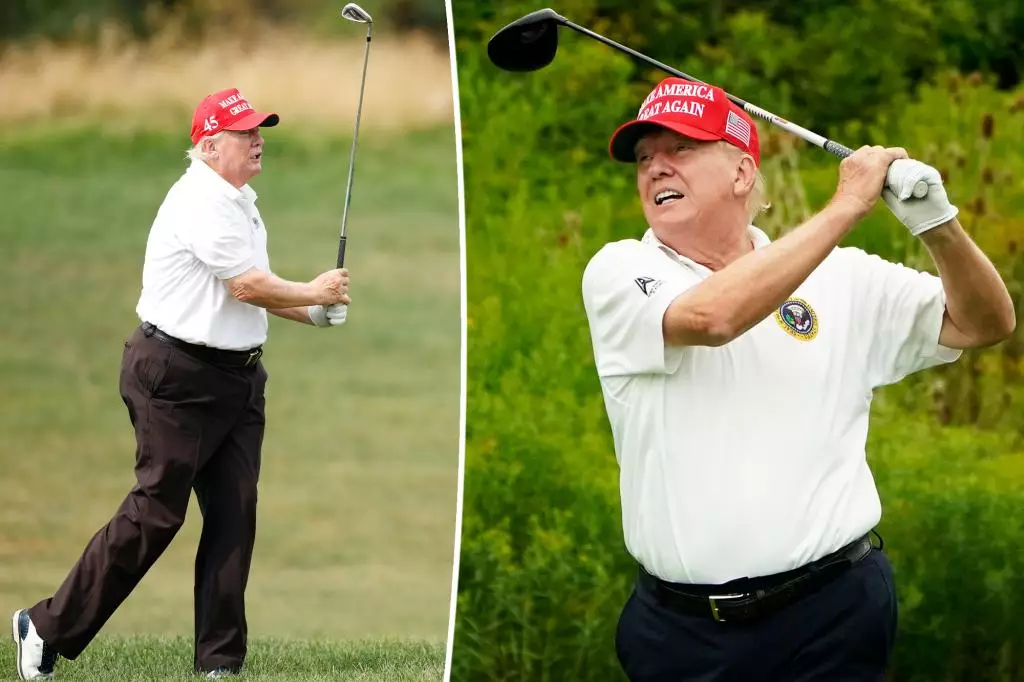The world of politics is often intertwined with personal pastimes, and for Donald Trump, golf has historically played a significant role. Recent reports indicate that Trump’s approach to golfing may soon be set for a transformation, as he prepares to take on the responsibilities of the Oval Office yet again. Despite his enduring love for the sport, comments from insiders suggest that he may prioritize his presidential duties over leisure time on the golf course, setting a precedent that will affect his golfing lifestyle.
Sources close to the former president have relayed that Trump intends to set aside his golf clubs to dedicate more time to managing national affairs. According to these insights, Trump is keenly aware of the heavy demands of the role he is stepping back into, explaining that “between the security threats and the need to kick his administration into high gear,” golf will have to take a back seat. This strategic pivot reflects a broader acknowledgment among political leaders that their commitments can overshadow personal indulgences, a lesson that holds different implications for various commanders-in-chief.
However, it remains unclear whether Trump can resist the allure of the golf course altogether. While he may limit his time with his regular golf buddies, reports indicate he may still indulge in the sport selectively. Playing “working” rounds with influential figures, such as Elon Musk and Senator Lindsey Graham, could provide Trump with both a reprieve from the pressures of governance and a platform to engage with key supporters. This nuanced approach highlights the balancing act that Trump must perform, maintaining his connection to friends while fulfilling expectations as a leader.
One major factor influencing Trump’s decision to scale back on golf is the heightened security landscape surrounding his presidency. Following an assassination attempt in September, it became apparent that safety concerns would dictate many of his choices. As described by sources, federal agents were unable to guarantee his safety while he enjoyed leisure at golf courses, which underscores the complexities of a political life in the spotlight. This urgency could lead to a greater emphasis on engaging in domestic politics rather than catering to personal desires for relaxation.
The strategic cessation of his usual golf habits might suggest that Trump is consciously choosing to craft a different image as he embarks on another presidential term. Whereas before he seemed willing to spend significant time on the golf course, the transition towards a more duty-focused approach may resonate with constituents who expect him to prioritize national interests over personal amusements.
Yet, one cannot overlook the sociopolitical implications of Trump’s longstanding relationships with his golfing associates. Having spent decades cultivating connections through the sport, Trump’s decision to limit these engagements could disrupt some of the informal channels through which he has historically interacted with influential figures. According to insiders, many of his golf companions are under the impression that their weekly fixtures on the greens may be on hold until Trump feels the country is restored to stability.
It’s essential to recognize that while golf is often seen as a leisurely activity, it is intrinsically linked to the fabric of American political culture, serving as a backdrop for critical dialogue and informal coalition-building. Trump’s selective golfing engagements might maintain a semblance of this tradition, but they also speak to a broader narrative of balancing personal enjoyment with the weight of governance in a tumultuous political climate.
In retrospect, Trump’s previous criticisms of President Obama for his golfing habits when he was a candidate provide a fascinating backdrop for understanding the current circumstances. Just as Obama faced backlash for his time away from the office, Trump’s current choices might invite scrutiny from different quarters. Navigating the expectations of public service while addressing the temptations of leisure is a common struggle for leaders, but few seem to engage with this tension quite like Trump.
As Trump reintegrates into the Oval Office, the shifting dynamics of his relationship with golf reflect not just personal choices, but also the broader narrative of political responsibility. While he may still find time to play with select allies, the evolving context suggests a newfound discipline that could shape his presidency moving forward. The path ahead is complex and multifaceted, and it remains to be seen how well Trump can reconcile his passion for golf with the demanding nature of leadership during a charged political era.
